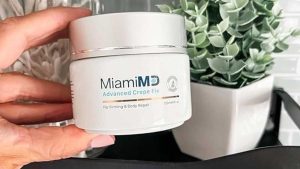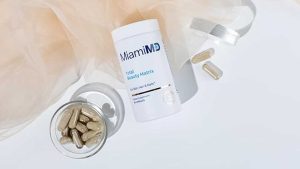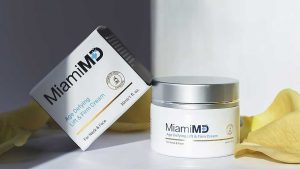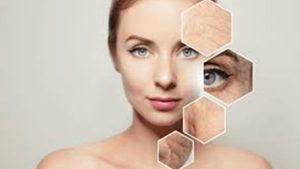How Long Do The Effects Of Vitamin C Last?

Vitamin C can be a miracle product for the face if you know how to use it. Once you’ve experienced the diverse benefits of vitamin C, you’ll likely be wondering exactly how long you can expect them to last.
MiamiMD has your answers, as well as information about the best ways to use vitamin C and how to extend its effects as long as you can. Don’t miss out on making this amazing vitamin part of your daily skincare routine.
What is Vitamin C?
We spend most of our lives being talked to about the importance of vitamins and minerals, whether it’s official medical advice or just parental advice — recommended daily allowances, what can happen if we don’t eat healthy, why we should always take a multivitamin for protective effects. The idea of vitamins and their health benefits for our whole bodies from our immune systems to our cholesterol levels to reducing cancer risk and keeping the common cold at bay have become fairly commonplace. But what really is a vitamin, and how does it really impact the body?
Vitamin C is the more common name for ascorbic acid or L-ascorbic acid, and is a vitamin that is found naturally in many foods including bell peppers, papaya, and citrus fruits like oranges, lemons, and limes. It is considered water-soluble, meaning that it can be easily dissolved in water. Humans can’t make (or synthesize) vitamin C on their own, so they need to obtain it through either vitamin C supplements or eating foods that contain decent levels of vitamin C to avoid a vitamin C deficiency.
Vitamin C is also considered an antioxidant. It works to help limit the potential oxidative stress that free radicals can cause by binding with them and stopping them from being able to cling to healthy cells in the body.
As a brief refresher, free radicals are molecules that have an unpaired electron. If you remember your science class, molecules always want to be in balance. When they aren’t, they can react unpredictably in an attempt to find other electrons that they can balance themselves out with. That’s what makes vitamin C, and other antioxidants, so important — free radical damage has been tied to things like cardiovascular disease, cancer, and a whole ton of other adverse effects, which is why getting enough vitamin C (and really enough of all vitamins and minerals) is so important for our health!
The Benefits of Vitamin C for the Face
The results that vitamin C can provide for the face can be summarized in two words: “brightening” and “tightening.”
First and foremost, vitamin C works to protect the skin from the effects of sun damage. As discussed earlier, vitamin C is considered an antioxidant. As it works to fight off free radical damage, it also reduces puffiness and redness.
Vitamin C can also help to reduce the appearance of dark spots on the skin.
In addition, it works to brighten the overall skin tone and complexion. This reduction in dullness is part of what returns a youthful glow. This is a cumulative effect, which means it gets better over time with regular usage. Try it on the under eye area as well, to help brighten up dark circles!
This amazing vitamin can also help keep the skin hydrated, decreasing what is known as transepidermal water loss. Without as much loss of hydration through the skin, the skin is able to retain much more of the moisture that you give it via serums and moisturizers. In many cases, this means that it helps to build up the moisture barrier in the skin. Not enough attention gets paid to the skin’s moisture barrier until it is damaged, leading to tightness (not the good kind), itching, redness, and overall discomfort. However, a damaged moisture barrier also leads to an inability to keep the bad things out while keeping the good things in.
And finally, vitamin C is a required component of the biosynthesis (or creation) of collagen in the body. When used topically, it can support healthy levels of collagen in the face. Because most of the fine lines and wrinkles in the face are caused by a lack of collagen that leads to sagging and thinning skin, increasing the amount of collagen can go a really long way toward helping to firm and smooth the face. Not only that, but it helps to preserve the integrity of both the collagen as well as elastin (or elastic fibers).
Overall, the vast majority of high doses of vitamin C have to do with its acidic nature, allowing it to help remove old, dead skin cells while replacing them with healthier, younger looking skin cells. It’s then that its antioxidant properties can kick in and work, protecting the skin, holding in hydration, and making the skin plumper and more youthful in appearance.
It’s really the “holy grail” of skincare products, because it really does work!
How Long Do The Effects of Vitamin C Last?
A lot of that depends on how exactly you use it. For best results, many dermatologists recommend combining oral intake of vitamin C supplementation (like our Total Beauty Matrix skin, hair, and nails vitamin) with topical application (like our Dark Spot Corrector cream) for the longest lasting, most impressive result.
You’ll also want to make sure to use vitamin C, especially the topical variety, during the day (it’s great to use under regular sunscreen).
Vitamin C has what is known as a “reservoir” effect, which means that even a small amount can last nearly all day long. If you can just remember to use the vitamin C in the morning before applying other skincare products (it works well with vitamin E!), you won’t have to worry about reapplying later in the day to get the full effect. In addition, you’re far more likely to encounter the ultraviolet radiation from sunlight during the day, so being able to protect your face from that is absolutely essential.
In order to extend the benefits of your vitamin C even further, make sure to keep it in a place that is protected from both light and air. When it gets exposed to either oxygen or natural sunlight, it starts to destabilize the vitamin C. It doesn’t take too long for it to be turned into its far less effective form, dehydroascorbic acid. Any bottle that contains vitamin C should be opaque, and pumps are great to keep air from entering into the bottle. Oxidized vitamin C will look more yellow or light brown in color. It won’t hurt you to use it, but it won’t be nearly as effective.
Because vitamin C is made less effective when it gets exposed to light, you’ll want to make sure that you give your cream or serum plenty of time to be absorbed into your skin before you go outside. As soon as your skin is dry, you’re ready to go. In general, you’ll want to apply your vitamin C cream under your moisturizer as well.
Is There Anything To Watch Out For With Vitamin C?
Overall, vitamin C is an incredibly safe product to use both topically and orally. Its status as a water-soluble vitamin means that any excess will be passed out of the body in the urine, which means it is very hard to overdose on, or experience toxicity or negative side effects with — though, we don’t recommend purposefully exceeding your intake level past the recommended dietary allowance (RDA) of about 60 to 100 mg of vitamin C per day (though you’ll see some vitamins offer up to 1000 mg!).
However, due to its naturally acidic nature, vitamin C can be a potential skin irritant. This is especially true for new vitamin C users, or those with sensitive skin. For a lower risk of having issues when starting out on vitamin C, start slow. Instead of using it twice a day, start out by using it just a few times a week. Once you’re sure that your skin is adjusting well, you can increase it slowly until you reach your optimal application amount (but remember, you’ll never need a large dose even then).
In addition, if you use products that contain retinol or alpha-hydroxy acids (AHAs), you’ll want to use them separately from vitamin C. As both of these products are acidic and have the potential to irritate the skin, using both at the same time doubles the likelihood that you’ll accidentally cause skin damage in pursuit of healthier skin. Once the moisture barrier gets damaged, it can take a fairly long time to repair it, so it’s best to do everything you can to keep it intact.
In Conclusion
Vitamin C is more than a dietary supplement that keeps scurvy at bay — it has the potential to create life changing results for your skin when used correctly.
MiamiMD believes in its benefits so much that we included it in multiple products, one that can be taken orally and the other that is meant to be used topically. Using vitamin C in this way can help extend its benefits as long as possible, tightening and brightening the skin to return you to that firm, youthful glow you had when you were younger.
Getting older doesn’t have to mean dealing with fine lines, wrinkles, or a dull complexion, so get your dose of vitamin C from our Total Beauty Matrix and Dark Spot Corrector today!
Sources:
https://ods.od.nih.gov/factsheets/VitaminC-HealthProfessional/
Tyrosinase – an overview | ScienceDirect Topics
https://pubmed.ncbi.nlm.nih.gov/16029672/





